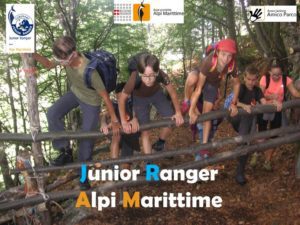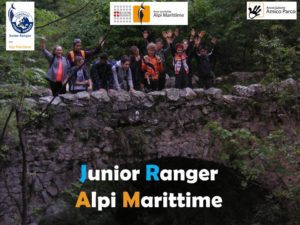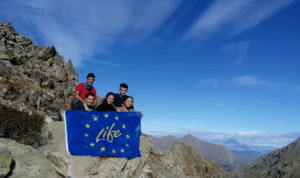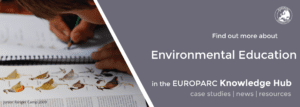Junior Ranger Case Studies: Alpi Marittime
To provide guidance and information on how to run the Junior Ranger programme, EUROPARC started to gather case studies describing how the programme is structured and managed in different parks. These case studies, in form of short interviews, are mainly intended to provide inspiration and ideas to Protected Areas willing to start the programme.
About Junior Ranger Alpi Marittime
Junior Ranger Alpi-Marittime (JRAM) is a project running in the Alpi Marittime Natural Park since 2011 – in Valle Gesso, although we did a prologue in 2005 by participating in the International Junior Ranger Camp in the Gesause national Park. Since 2016, after our Protected Area merged with the Marguareis Park, we have extended the program to the young people of the Pesio valley.

Activities take place with the aim of “learning by doing”. The experiences are carried out as extra-curricular activities, but taking into account the didactic indications of the teachers, so that effective and fruitful synergies are established between Schools and the Park.
How do you recruit young people? How many Rangers/Mentors are involved and how many Junior Rangers?
Every year, at the beginning of spring, an activity program is proposed which lasts until late autumn. For each participant who signs up, a contribution of € 20 per year is required for their enrollment in the “Amico Parco” which is a Volunteer Association that works in synergy with the Park Authority. The current president of Amico Parco is Patrizia Rossi, who was formerly president of EUROPARC. The subscription to Amico Parco allows us to give everyone a Liability insurance.
We have boys and girls who started at the age of 11, now they are 18 and are proud to be Junior Rangers.
Some numbers: in 2011 we had 12 participants, in 2012: 20, 2013: 27, 2014: 16, 2015: 18, 2016: 26, 2017: 35, 2018: 46, 2019: 46.
Actually, many Junior Rangers (JR) continue to follow us over time, we have boys and girls who started at age 11 and now have 18 who are proud to be JRs.
How are your activities organised?
Generally we distribute the activities across 12-14 meetings over the year. This year for example we have introduced the “mountain safety” theme, which is being integrated in all the outdoor activities we are running (snowy environments, first aid, emergency management, etc.). We also carry out volunteer activities, such as cleaning paths, garbage collection, questionnaires to raise awareness about the wolf or the ibex, presence and representation in the occasion of Park events.
We have created a special JRAM card. With that JRs receive special gadgets and rewards when they have reached a certain step: JRAM brown shirt, notebook and pen, JRAM cap, backpack; knife-compass set, torch. At the last step they return the brown t-shirt and receive the blue JRAM t-shirt, which sets the end of their JR path.
Among the most significant activities we have organised:

- In 2012 and 2015 we participated in the international release of the Bearded Vulture, one of which has the name “Junior Ranger”.
- In 2012, with the support of the Municipality of Valdieri, we produced a video on waste management, to raise citizens’ awareness on waste recycling.
- Since 2016 we have participated in the event “Youth at the Top”: two days in the mountains, with an overnight stay and excursions (Project coordinated by Alparc with the contribution of the German Ministry for the Environment).
- In 2017 we worked on the natural return of the wolf in the Alps, with actions related to the LIFE Wolfalps project, and we stayed 3 days in Lessinia, a territory hostile to wolves from the socio-political point of view, meeting a delegation of local farmers and making visits to the pastures.
What are the main achievements and benefits for young people and for the Protected Area?
First of all, by participating in the EUROPARC Junior Ranger program, young people from the Maritime Alps become part of a great network of boys and girls living in the territories of European natural parks.
The participation in the JRAM promotes cooperative exchanges and experiences, with a social consideration and proactive intent, encouraging young people to behave responsibly towards their environment and cultural heritage.
Participating in the EUROPARC Junior Ranger program, young people from the Maritime Alps become part of a great network.
There is a strong impact on families and consequently an excellent perception of the educational role and mission of the park on the territory. This is well seen by our leaders and the political bodies of the Park, therefore as mentors we feel we are bearers of a great responsibility.
A better knowledge of one’s own territory and of major projects is promoted by the Park Authority.

What are the main costs and how do you finance them?
The Park Authority allocates 2,000 euros a year to the Junior Ranger program and provides staff, two teaching service employees and four park wardens. With the registration fees at Amico Parco we can manage any activity costs. We try to include in the JRAM program actions related to Alcotra or Life projects that have funds for educational activities. We participate in calls for tenders or financed events.
Any other information that you think would be useful to share?
At the beginning of the season we hold a presentation meeting with parents and young potential JRAM participants. We have created a Watshapp Group for fast communications with families. For general information we use e-mail sending the information about two weeks before the event to get the number of participants and manage the activities in the best way. We work hard!
Do you also want to share your experience with running the Junior Ranger Programme in your park? We will be happy to spread your ideas around – just drop us a mail: f.minozzi@europarc.org
